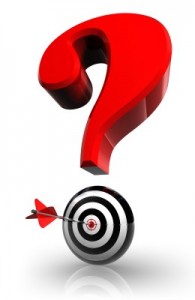
Image credit: donskarpo / 123RF Stock Photo
This week we continue our discussion of question marks.
You should use a question mark at the end of a sentence that seems to be a statement except that your voice rises at the end like you are asking a question.
- You think I will believe that you were at the library?
- Surely you didn’t mean what you said to the boss yesterday?
When you have a short question at the end of a sentence, use a comma before the question and a question mark after it.
- We don’t have to attend the training, do we?
- You’re going on vacation for two weeks, aren’t you?
Short questions that fall within a sentence can also be set off with dashes or parenthesis instead of commas. These questions are often called “tag or echo questions.”
- The new association president—do you know her?—emailed me.
- The new shopping mall—have you been there?—has great stores.
Where a longer direct question comes at the end of a sentence, start the question with a capital letter and precede the question with a colon or a comma. The question mark ending the question also ends the sentence.
- The question is, Have you completed your application for a Board position? (Direct question)
Note, however, that shifting the order of the words can transform a direct question into an indirect question. In a direct question, the verb precedes the subject (shall we, can we). In an indirect question, the verb follows the subject (we shall, we can).
- The question is whether or not you have completed your application for a Board position. (Indirect question)
See how the indirect question asks whether or not you have and the direct question above asks have you? That makes the difference in whether to use the question mark or not.
Where you have a series of brief questions at the end of a sentence, you can separate them by commas or with question marks (if you want more emphasis). However, you do not capitalize the individual questions where they are all related.
- Does the position include typing, drafting documents, and scheduling appointments? (This implies that the position includes all of these things.)
- Does the position include typing? drafting documents? scheduling appointments? (This implies that the position may include one or more, but not necessarily all, of these things.
If, however, you have a series of independent questions, you will capitalize each question and end each question with a question mark.
- Before accepting the position, you should confirm the following: Are you qualified for the position? Is there on-the-job training to keep your skills current? Is the pay in the range you are looking for?
Sometimes, independent questions in a series are elliptical (or condensed) expressions. See The Question Is What Happened to the Question Mark? post.
- Did Jim sell his Corvette? To whom? For how much? When? (This is read to mean “Did Jim sell his Corvette? To whom did he sell the Corvette? For how much money did he sell the Corvette? When did he sell the Corvette?”)
You can also use a question mark inside parenthesis where there is doubt or uncertainty about a word or phrase in a sentence.
- He was born in 1983(?).
In this case, you do not put a space before the parenthesis.
Note that just because a sentence includes the words ask or question does not automatically make it a question needing a question mark. If it is an indirect question, use a period, not a question mark.
- Rose asked if she could help clear the table.
- The question is how much time he gets for vacation.
Now you hopefully know more than you ever thought you would know (or need to know) about question marks. If you have another proofreading issue that perplexes you, please send it to [email protected] and I will work on getting an answer for you.


 Follow
Follow